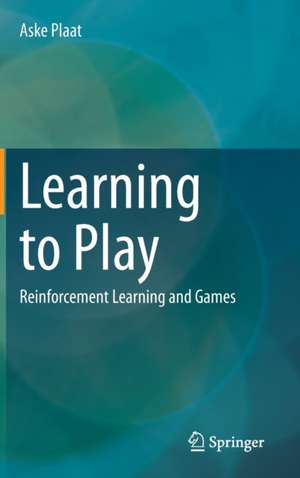Learning to Play: Reinforcement Learning and Games
Autor Aske Plaaten Limba Engleză Hardback – 22 noi 2020
After an introduction to the core concepts, environment, and communities of intelligence and games, the book is organized into chapters on reinforcement learning, heuristic planning, adaptive sampling, function approximation, and self-play. The author takes a hands-on approach throughout, with Python code examples and exercises that help the reader understand how AI learns to play. He also supports the main text with detailed pointers to online machine learning frameworks, technical details for AlphaGo, notes on how to play and program Go and chess, and a comprehensive bibliography.
The content is class-tested and suitable for advanced undergraduate and graduate courses on artificial intelligence and games. It's also appropriate for self-study by professionals engaged with applications of machine learning and with games development. Finally it's valuable for any reader engaged with the philosophical implications of artificial and general intelligence, games represent a modern Turing test of the power and limitations of AI.
| Toate formatele și edițiile | Preț | Express |
|---|---|---|
| Paperback (1) | 310.63 lei 38-44 zile | |
| Springer International Publishing – 22 noi 2021 | 310.63 lei 38-44 zile | |
| Hardback (1) | 475.32 lei 6-8 săpt. | |
| Springer International Publishing – 22 noi 2020 | 475.32 lei 6-8 săpt. |
Preț: 475.32 lei
Preț vechi: 594.15 lei
-20% Nou
Puncte Express: 713
Preț estimativ în valută:
90.99€ • 93.58$ • 75.49£
90.99€ • 93.58$ • 75.49£
Carte tipărită la comandă
Livrare economică 19 februarie-05 martie
Preluare comenzi: 021 569.72.76
Specificații
ISBN-13: 9783030592370
ISBN-10: 3030592375
Pagini: 330
Ilustrații: XIII, 330 p. 111 illus., 72 illus. in color.
Dimensiuni: 155 x 235 x 27 mm
Greutate: 0.66 kg
Ediția:1st ed. 2020
Editura: Springer International Publishing
Colecția Springer
Locul publicării:Cham, Switzerland
ISBN-10: 3030592375
Pagini: 330
Ilustrații: XIII, 330 p. 111 illus., 72 illus. in color.
Dimensiuni: 155 x 235 x 27 mm
Greutate: 0.66 kg
Ediția:1st ed. 2020
Editura: Springer International Publishing
Colecția Springer
Locul publicării:Cham, Switzerland
Cuprins
Introduction.- Intelligence and Games.- Reinforcement Learning.- Heuristic Planning.- Adaptive Sampling.- Function Approximation.- Self-Play.- Conclusion.- App. A, Deep Reinforcement Learning Environments.- App. B, Running Python.- App. C, Tutorial for the Game of Go.- App. D, AlphaGo Technical Details.- References.- List of Figures.- List of Tables.- List of Algorithms.- Index.
Notă biografică
Prof. Aske Plaat is Professor of Data Science at Leiden University and scientific director of the Leiden Institute of Advanced Computer Science (LIACS). He is co-founder of the Leiden Centre of Data Science (LCDR) and initiated the SAILS stimulation program. His research interests include reinforcement learning, scalable combinatorial reasoning algorithms, games and self-learning systems.
Textul de pe ultima copertă
In this textbook the author takes as inspiration recent breakthroughs in game playing to explain how and why deep reinforcement learning works. In particular he shows why two-person games of tactics and strategy fascinate scientists, programmers, and game enthusiasts and unite them in a common goal: to create artificial intelligence (AI).
After an introduction to the core concepts, environment, and communities of intelligence and games, the book is organized into chapters on reinforcement learning, heuristic planning, adaptive sampling, function approximation, and self-play. The author takes a hands-on approach throughout, with Python code examples and exercises that help the reader understand how AI learns to play. He also supports the main text with detailed pointers to online machine learning frameworks, technical details for AlphaGo, notes on how to play and program Go and chess, and a comprehensive bibliography.
The content is class-tested and suitable for advanced undergraduate and graduate courses on artificial intelligence and games. It's also appropriate for self-study by professionals engaged with applications of machine learning and with games development. Finally it's valuable for any reader engaged with the philosophical implications of artificial and general intelligence, games represent a modern Turing test of the power and limitations of AI.
Caracteristici
Author takes as inspiration breakthroughs in game playing, and using two-agent games to explain the full power of deep reinforcement learning Suitable for advanced undergraduate and graduate courses in artificial intelligence, machine learning, games, and evolutionary computing, and for self-study by professionals Author uses machine learning frameworks such as Gym, TensorFlow, and Keras, and provides exercises to help understand how AI is learning to play
